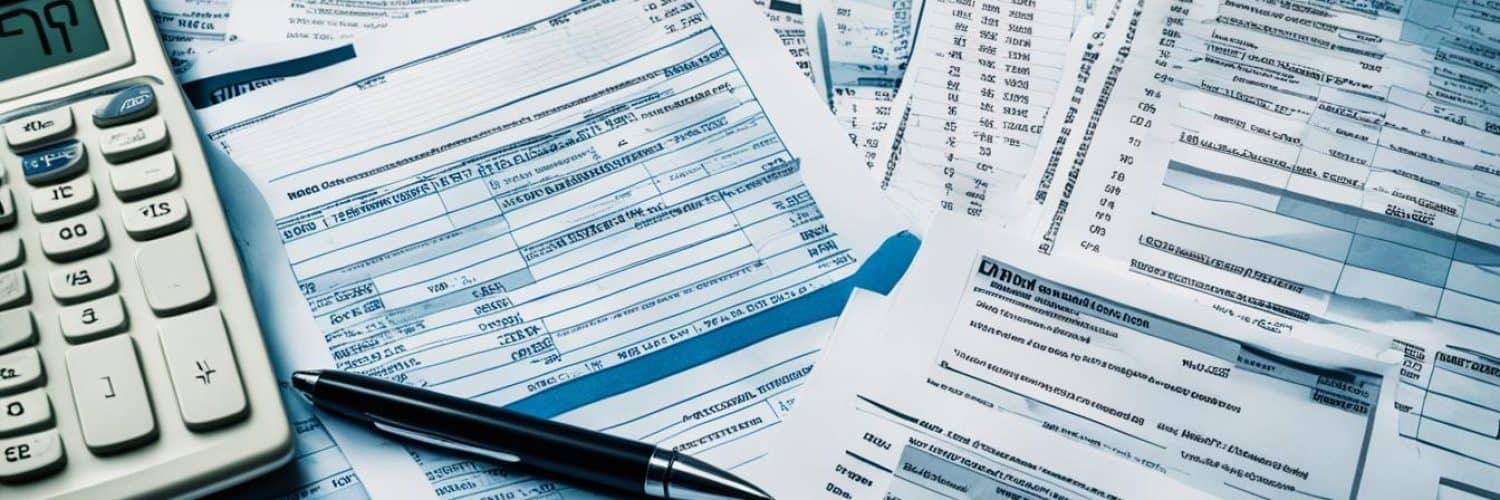Going through a divorce can be tough, both emotionally and financially. It’s important to handle the money side well. We’ll guide you through steps to prepare for divorce financially. This way, you can protect your assets, plan for the future, and take charge of your money.
Key Takeaways
- Understand the financial impact of divorce, including asset division, alimony, and child support negotiations.
- Gather and organize your financial records to gain a clear picture of your financial situation.
- Seek professional guidance from a certified divorce financial analyst to navigate the complexities of the settlement process.
- Develop a post-divorce budget and plan for your financial future as a single person.
- Protect your assets and ensure a fair division during the divorce settlement.
Track Your Expenses and Anticipate Future Ones
When you know a divorce is coming, start tracking your income and spending right away12. This info is key for your lawyer and the judge to figure out how to split things and set support payments2.
Gather Financial Records
Collect important papers like bank statements, investment records, loan details, pay slips, and tax forms2. These documents show what you own, owe, and your financial health. They’re vital for getting through the divorce smoothly12.
Project Future Expenses Beyond Monthly Bills
Think about more than just your regular bills when planning for after the divorce. Consider things like vacations, fixing up your home, and your kids’ needs that might change2. Planning ahead helps you get ready for the financial changes you might face after the divorce12.
| Expense Category | Current Amount | Projected Post-Divorce Amount |
|---|---|---|
| Mortgage/Rent | $2,000 | $1,500 |
| Utilities | $500 | $400 |
| Groceries | $800 | $600 |
| Child Care | $1,000 | $1,200 |
| Car Payments | $400 | $300 |
| Vacation | $3,000 | $2,000 |
| Home Repairs | $1,000 | $800 |
This table shows how your spending might change after a divorce. It’s key to think ahead about your future costs2.
“Tracking your expenses and anticipating future ones is a crucial first step in preparing for a financially secure future after divorce.”
By keeping a close eye on your money, spending, and what you own, you’ll be ready for the divorce. You’ll make better choices about splitting your money123.
Seek Professional Financial Guidance
Going through a divorce can be tough, especially when it comes to money matters. Getting help from financial experts can be a big relief. They offer the knowledge and support you need to get through this tough time. Whether your divorce is friendly or not, these pros can guide you to a better financial future4.
Consider Hiring a Certified Divorce Financial Analyst
A certified divorce financial analyst (CDFA) is a pro who specializes in divorce finances. They can look at your current money situation, think about what you’ll need later, and help with tricky stuff like dividing assets and figuring out support4. They can also check out settlement offers and help you make choices that fit your long-term money goals.
Getting a CDFA is a smart move if your divorce deals with a lot of money, complicated financial plans, or you’re not sure about the money effects of the settlement. They offer clear advice and help, making you feel more sure and clear about what you’re doing.
“A CDFA can be an invaluable asset in divorce, providing the financial expertise and insights you need to make informed decisions about your future.”
When picking a CDFA, look for someone with lots of experience in divorce finances, good at talking to people, and focused on helping you5. This expert can be a big help in keeping your finances safe during and after the divorce.
You might also want to talk to other financial pros, like a tax accountant or estate planner, to make sure you’re set for the long run6. Getting advice from experts means you can make smart choices and protect your money during this hard time.
Understand the Divorce Settlement Process
The divorce settlement process is key to ending a marriage. It decides how to split assets, debts, alimony, and child support. Knowing how this works in your state is crucial, as laws differ a lot7. Your lawyer will help you through each step, protect your rights, and aim for the best deal for your situation8.
The divorce settlement process includes these steps:
- Collect all financial records, like bank statements, savings, investments, and tax returns8.
- Figure out the value of assets you and your partner own together or separately, like houses, cars, and businesses8.
- Work out how to split assets and debts. This depends on the marriage’s length, each spouse’s financial needs, and what’s best for the kids7.
- Settle on alimony and child support if needed, based on each spouse’s income and costs7.
- Make the divorce settlement official, then have the court review and approve it8.
The divorce settlement process can be tricky, affected by state laws, your situation, and how well you and your partner work together8. Getting help from a Certified Divorce Financial Analyst (CDFA) can make handling the financial parts easier8.
The divorce settlement process is a big step towards starting anew. By understanding it and getting expert advice, you can aim for a fair settlement that safeguards your financial well-being789.
Be Cautious About Making Major Financial Changes
When going through a divorce, be careful with big financial moves. Don’t change who gets what or take out money without waiting for the divorce to end. This could be seen as breaking the rules of the court and might not work out well10. It’s better to be open with your spouse and wait until you have a settlement11.
Divorces can cover many things like student loans, houses, cars, investments, retirement accounts, and savings10. A Certified Divorce Financial Analyst (CDFA) can help list all your stuff, figure out taxes, value retirement accounts, and plan for after the divorce10. A CDFA is a good idea if you have things like houses, cars, investments, retirement plans, debts, and kids10.
It’s important to share all your stuff during a divorce to make sure things are split fairly11. Not thinking about how to sell a house or valuing a business can be mistakes during a divorce10. If you hide assets, it can raise red flags and you should be open and get professional help10.
Getting a divorce can take a few months to over a year, depending on the court or mediation11. Couples should know it might take a while and the outcome depends on their situation11. After the divorce, you’ll need to update wills, move assets, change bank accounts, update ID, and make other changes quickly10.
“Maintain transparency with your spouse and avoid drastic changes to your financial situation until the divorce settlement is reached.”

Remember, making big financial moves without talking to your spouse could mess up the divorce. Being careful and open can make the transition to your new financial life smoother.
Gather Documentation of Assets and Debts
Getting ready for divorce means you need to list your money stuff. Start by making a list of what you own, like houses, cars, investments, bank accounts, and stuff you own12. Also, note down what you owe, like loans and credit card debt12. This info is key when dividing things up.
Include Joint and Individual Accounts
Make sure to list both things you share with your partner and things just for you12. This gives a full view of your money situation. It helps make sure things are split fairly12.
- Get statements for checking and savings accounts, investment accounts, retirement accounts, and other financial stuff12.
- Collect tax papers, W-2s, and other tax stuff from the last 2-3 years to show how much you make and work12.
- Find out how much your real estate is worth, including any investment properties, for your asset list12.
- Include info on businesses, trusts, inheritances, and gifts, as they can change how things get split12.
- Write down big expenses now or planned for the future, like college funds or home fixes, to help decide on support12.
A detailed financial statement with your assets and debts and their values is a great tool for talking to your lawyer12.
| Financial Documents to Gather | Timeframe |
|---|---|
| Assets, Debts, Expenses | 5 years |
| Tax Returns, Paystubs | 3 years |
| Bank Statements, Investment Statements | 1 year |
| Personal Property Inventory | Current |
Getting your financial papers in order is key to getting ready for divorce. By listing your assets and debts well, you can negotiate fairly during the settlement13.
“The more you tell your lawyer about your money, the better they can fight for you in divorce.”
Being upfront and proactive with your money info can protect your rights and lead to a good outcome in your divorce14.
Prepare for Potential Resistance from Your Spouse
Going through a divorce means you might face resistance, especially when sharing financial details. In friendly divorces, couples often share their financial info freely15. But, in tough cases, your partner might not want to share documents or cooperate15. Being ready for this and working with your lawyer can help you get the financial info you need through court orders.
It’s smart to collect as many financial documents as you can before filing for divorce15. This includes things like bank statements, tax returns, lists of assets and debts, and income details15. Having these documents ready can make the process smoother and help divide assets fairly.
It’s common for one spouse to resist during divorce, especially if they’ve always handled the money15. Getting help from experts like certified divorce financial analysts (CDFAs) can be really helpful15. They can help you get a fair financial deal.
“Divorce is one of the most financially complex legal processes an individual can face. Having a CDFA in your corner can make all the difference in achieving a fair and equitable settlement.”
During the divorce, don’t make big financial moves on your own before it’s all settled15. Talk to your lawyer and financial advisors to make sure you’re following the law and protecting your money.
Getting ready for your spouse’s resistance can make dealing with divorce’s financial challenges easier15. With the right legal and financial advice, you can get past the hurdles and secure a better financial future.
how to financially prepare for divorce
Getting ready for divorce means taking key steps to make the change smoother and protect your future finances. By being proactive and getting the right info, you can handle the financial parts of divorce better.
- Track Your Expenses and Anticipate Future Ones: Write down your current and future costs, like housing, childcare, and healthcare. This helps you understand your financial duties and plan better16.
- Seek Professional Financial Guidance: Think about getting a certified divorce financial analyst to help you with the financial parts of divorce. They can make sure you get a fair deal for your needs now and later16.
- Understand the Divorce Settlement Process: Learn about the legal and financial parts of settling a divorce, like dividing stuff and debts, alimony, and child support. Knowing this helps you make smart choices17.
- Gather Documentation of Assets and Debts: Make a detailed list of your and your partner’s money matters, like bank statements and property info. This is important for the divorce17.
- Prepare for Potential Resistance from Your Spouse: Be ready for your partner to fight for their share of money. Talk to a lawyer to protect your rights17.
By doing these things, you can get ready for divorce and protect your future money. Getting help from experts and understanding your finances well are key to getting through this tough time.
Starting a divorce can feel scary, but with the right steps, you can come out financially strong. The journey is tough, but preparing financially helps reduce risks and focuses on your health.
| Metric | Impact on Women | Impact on Men |
|---|---|---|
| Household Income Drop | 41% decrease16 | 23% decrease18 |
| Time to Recover Financially | Longer than men16 | Shorter than women16 |
| Lifestyle Changes | Significant for one-third of women16 | Not specified |
The data shows divorce hits women harder financially than men. This makes it even more important to prepare well and get expert advice to face the challenges and keep your finances safe.
“A certified divorce financial analyst can be instrumental in securing a settlement that suits your present and future financial needs.”
Getting financially stable after divorce takes time and effort, but it’s doable. With the right plans and support, you can come out stronger and ready for the future161718.
Establish Separate Financial Accounts Post-Divorce
After the divorce is over, it’s key to separate your money from your ex’s. This means closing any joint bank and investment accounts and making sure your name is off any shared credit accounts19. It’s a good idea to open a new bank account just for yourself to start fresh19.
Think about how to split investment and retirement accounts. Some investments are riskier than others and can affect your taxes19. A Qualified Domestic Relations Order (QDRO) is a special court order for dividing retirement plans like 401(k) and 403(b) during a divorce19.
Make sure to close any joint bank accounts and find out which credit cards and loans you share to fully separate your finances after the divorce19. When dividing retirement assets, remember to consider fees and taxes19. You’ll also need to refinance a home you own with your ex to take their name off the mortgage19.
By setting up separate financial accounts, you can take back control of your money and start fresh financially19. Yes, separating your finances can seem tough, but with the right advice and planning, you can do it well19.

“Separating your finances after a divorce can be a complex process, but it’s essential for your long-term financial well-being. By taking the time to carefully unravel your financial ties, you can regain control and build a stronger financial foundation for your future.”
As you move forward, think about getting help from a financial expert, like a certified divorce financial analyst19. They can help you make smart choices about your money and debts192021.
Determine Your Post-Divorce Income Sources
When going through a divorce, think about what you’ll earn after it’s over. This could be from alimony, child support, or a job22. Knowing how much money you’ll get or give will help you budget for the future22.
Consider Alimony, Child Support, Employment
If you didn’t work while you were married, start looking for a job now23. This will make sure you’re financially independent and have a steady income23. Also, any money you get from alimony or child support is key to your income22. Make sure you know the rules of these payments to plan your money well22.
Talking to a Certified Divorce Financial Analyst (CDFA®)22 can help you understand your income after the divorce. They offer advice on managing your finances during and after divorce22.
“The first few years after divorce can be financially challenging, as the same cumulative income and assets now need to support two separate households instead of one.”22
Thinking about your income after the divorce helps you plan for your financial future. It sets you up for success in the next chapter of your life.
Create a Post-Divorce Household Budget
Creating a budget after a divorce is key to staying financially stable. You need to look at your income and expenses, especially if your lifestyle or living situation has changed24. After a divorce, you might earn less and have less savings24. You’ll have new costs like mortgage, car payments, health insurance, and groceries to budget for24. Moving from two incomes to one often means spending less.
To make a good budget, find ways to spend less or adjust your spending to fit your new financial situation24. List all your expenses, like mortgage, transport, food, insurance, debt, childcare, clothes, and personal care items, to make a full budget24. Needs include housing, transport, food, and insurance. Wants are things like entertainment, eating out, and lifestyle choices that you can adjust based on what you can afford24. Keep an eye on your spending and income to avoid spending too much by subtracting your monthly expenses from your income.
Managing your budget well helps you avoid more debt and plan for the future24. You might need to adjust your budget to spend less, find more income, cut unnecessary costs, or prioritize some expenses25. Getting help from a financial planner or counselor can make creating and adjusting your budget easier, tailored to your financial situation and goals.
- 26 After a divorce, you’ll likely have big one-time costs like legal fees, down payments, and setting up new utilities.
- 26 Financial experts say start an emergency fund with $1,000 first, aiming for 3–6 months’ expenses in savings.
- 26 Put part of your budget towards important expenses, retirement savings, and short-term savings. Update your budget as your needs change.
- 26 Plan for the future by making small contributions to retirement accounts and adjusting your investments for your new financial situation.
With a solid post-divorce budget, you can handle your expenses, adjust your lifestyle, and work towards financial stability during this big change.
Start Your Own Retirement Plan
Going through a divorce can be tough, but focusing on your financial future is key. If you’ve depended on your spouse’s retirement accounts, now is the time to start your own. Individual Retirement Accounts (IRAs) are a good choice because they offer tax benefits and let you manage your retirement savings27.
Explore Options Like IRAs and QDROs
Consider using a Qualified Domestic Relations Order (QDRO) too. A QDRO lets you move part of your ex-spouse’s retirement money to your own plan without paying extra taxes. This can be really helpful for your financial safety during and after the divorce28.
When dividing retirement savings, getting advice from financial experts and lawyers is key. Retirement accounts like 401(k)s and IRAs are often seen as shared property and might need to be split during the divorce29.
By starting your own retirement plan, you can safeguard your financial future and have a secure retirement after a divorce. Remember, the choices you make now affect your financial health for many years.
“Divorce can be tough, but with the right financial planning and advice, you can come out strong with a retirement plan that ensures your financial security for the long term.”
Decide on the Marital Home’s Future
Deciding what to do with the marital home is a big step in a divorce. Couples have three main choices: buy out the other partner, keep co-owning, or sell and split the money30. Each option has its own effects that you should think about to protect your money later30.
Consider Buyout, Co-Ownership, or Sale
If one partner wants to stay in the home, buying out the other might be the way to go. This means one person pays for the other’s share of the home’s value, making them the only owner30. Or, the couple might decide to keep owning the home together, which can be tricky but helps with kids30. Selling the home and splitting the money can also be an option, but think about where you’ll live next30.
| Option | Considerations |
|---|---|
| Buyout | – Requires one spouse to purchase the other’s share of the home’s equity – Can provide stability, especially if children are involved – Impacts long-term financial planning and housing needs |
| Co-Ownership | – Allows for continued joint ownership of the marital home – Can be complex to manage, requiring clear agreements – May provide stability for children, but can be challenging for divorced spouses |
| Sale | – Offers a clean break and division of assets – Proceeds can be used to establish new housing – Impacts longer-term financial planning and housing needs |
Choosing what to do with the home affects your money in many ways, like mortgage payments and equity30. Getting advice from a financial expert can help you make a smart choice and protect your money30.
Think about your future when deciding to keep, share, or sell the home30. By looking at your options and getting advice, you can make a choice that helps you financially after the divorce30.
“Navigating the division of the marital home can be one of the most challenging aspects of a divorce, but with careful planning and the right guidance, you can make a decision that aligns with your long-term financial goals.”
Protect Your Financial Future as a Single Person
Going through a divorce can change your life a lot. It’s key to take steps to protect your money as a single person. This means rebuilding your credit, opening new financial accounts, and making a long-term financial plan31.
Get advice from financial experts, like a certified divorce financial analyst, to make smart choices. This helps you reach your goals and succeed in the future31. Being separated legally before the divorce can protect your money, as Jeremy Straub of Coastal Wealth suggests31.
It’s important to handle joint assets and debts fast. Over half of couples have joint credit card debt after a divorce. So, it’s key to separate these debts31. Robert Gauvreau, a CPA, says to move 50% of joint account money to a separate account right away to avoid financial problems31.
- Boost your credit by checking your credit reports and fixing any mistakes32.
- Open new financial accounts, like checking, savings, and investment accounts, to manage your money on your own33.
- Make a detailed budget after the divorce to keep track of your money31.
Usually, assets are split equally in a divorce, unless there are special cases like inheritances or premarital assets31. Do a cash flow analysis to see your income and expenses, as Laura Medigovich suggests31. But, be careful about giving up control of assets during the divorce, as Robert Gauvreau warns, as it might let your ex spend it all31.
Also, think about how divorce affects taxes, which can change how assets are split and alimony is paid31. Alimony isn’t tax-deductible for the payer anymore after December 31, 2018. So, it’s important to know these changes31.
“Focusing on financial matters during negotiations can help you get the best deal in your divorce settlement,” says Erin Wood of the Carson Group31.
By acting now to protect your finances as a single person, you can handle the divorce better. Being informed and ready helps you face the challenges and chances ahead.
Conclusion
Going through a divorce can be tough on your wallet, but you can come out on top with the right plan and help from experts34. Keep an eye on your spending, get advice from pros, protect your stuff, open your own bank accounts, and make a budget for after the divorce. This way, you can take charge of your money and live well on your own.
Dealing with divorce can feel overwhelming, but knowing how to split up your stuff and understand about alimony or child support34 helps you plan for the future35. Talking to a divorce financial expert and a family lawyer can give you great advice. They help you make smart choices that keep your money safe.
Even with the tough parts, you can get through the divorce and come out stronger. Focus on divorce financial planning and post-divorce financial management. This way, you can make sure you’re financially stable and feel confident about the future36.
FAQ
How do I track my expenses and anticipate future costs during a divorce?
When should I seek professional financial guidance for my divorce?
What should I know about the divorce settlement process?
How can I protect my assets during the divorce process?
What documentation should I gather to prepare for the divorce?
How can I handle a spouse who is resistant to disclosing financial information?
What are the key steps to financially prepare for a divorce?
How do I separate my finances from my ex-spouse after the divorce is finalized?
What should I consider when determining my post-divorce income sources?
How do I create a comprehensive post-divorce household budget?
How can I establish my own retirement plan after a divorce?
What are the options for handling the marital home during a divorce?
How can I protect my financial future as a single person after a divorce?
Source Links
- https://www.abearlaw.com/financially-preparing-divorce-process/
- https://www.cnbc.com/2017/06/22/7-ways-to-ready-your-finances-for-divorce.html
- https://www.ramseysolutions.com/relationships/how-to-prepare-for-divorce-checklist
- https://www.tiaa.org/public/learn/prepare-unexpected/how-to-prepare-financially-before-and-after-divorce
- https://www.protective.com/learn/budgeting-101-how-to-financially-survive-a-divorce
- https://www.usbank.com/wealth-management/financial-perspectives/financial-planning/financial-planning-for-divorce-dividing-money-after-split.html
- https://www.debt.org/family/divorce/preparing-for-divorce-financially/
- https://www.experian.com/blogs/ask-experian/how-to-prepare-finances-for-divorce/
- https://www.investopedia.com/articles/personal-finance/093015/divorce-planning-checklist-what-you-need-know.asp
- https://www.whenitsknotforever.com/blog/how-to-financially-navigate-your-divorce-an-experts-advice-on-the-steps-you-should-take-before-during-and-post-divorce
- https://www.tiffanygraveslaw.com/news/getting-ready-for-divorce-8-essential-tips-from-legal-experts-to-help-you-successfully-navigate-splitting-up-financially-and-emotionally
- https://www.lasher.com/financial-documents-to-gather-for-your-divorce/
- https://www.cbmcpa.com/2023/06/09/3-types-of-financial-documents-you-need-to-prepare-for-divorce/
- https://www.lawjur.com/divorce-planning-ways-you-can-financially-prepare-for-divorce/
- https://www.nerdwallet.com/article/finance/7-ways-to-prepare-your-finances-for-divorce
- https://www.theskimm.com/ask-an-expert/how-to-prepare-your-finances-for-divorce
- https://www.thebalancemoney.com/how-to-financially-prepare-for-divorce-7092480
- https://www.kiplinger.com/personal-finance/604621/5-critical-steps-to-help-women-financially-prepare-for-divorce
- https://www.investopedia.com/how-to-un-merge-your-money-in-a-divorce-4687311
- https://www.comerica.com/insights/personal-finance/how-to-manage-your-finances-during-a-divorce.html
- https://www.divorcenet.com/resources/preparing-finances-before-divorce.html
- https://institutedfa.com/surviving-financially-after-divorce/
- https://colwell-law.org/blog/divorce-finances/
- https://hellodivorce.com/expenses/how-to-create-a-post-divorce-budget
- https://www.mainlinedivorcemediator.com/healthy-divorce-blog/how-to-budget-for-a-comfortable-post-divorce-life
- https://www.fidelity.com/learning-center/life-events/tips-for-budgeting-after-divorce
- https://www.citizensbank.com/learning/retirement-savings-after-divorce.aspx
- https://www.kiplinger.com/personal-finance/divorce-steps-to-prepare-your-finances
- https://smartasset.com/retirement/ways-to-protect-your-retirement-savings-after-divorce
- https://www.sterlinglawyers.com/illinois/property-division/splitting-assets-divorce/
- https://hermoney.com/connect/marriage/how-to-financially-protect-yourself-in-a-divorce/
- https://www.forbes.com/sites/forbesfinancecouncil/2022/01/14/13-crucial-actions-to-protect-your-personal-finances-during-and-before-a-divorce/
- https://elisebuiefamilylaw.com/7-smart-ways-to-protect-yourself-financially-in-divorce/
- https://www.thevirgalawfirm.com/blog/2020/september/how-do-i-financially-prepare-for-the-conclusion-/
- https://www.mediationfirst.co.uk/blog/preparing-financially-for-divorce.html
- https://www.frankfamilylaw.com/blog/2024/ways-you-can-financially-prepare-for-a-divorce.html







Add comment